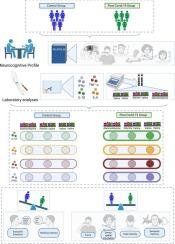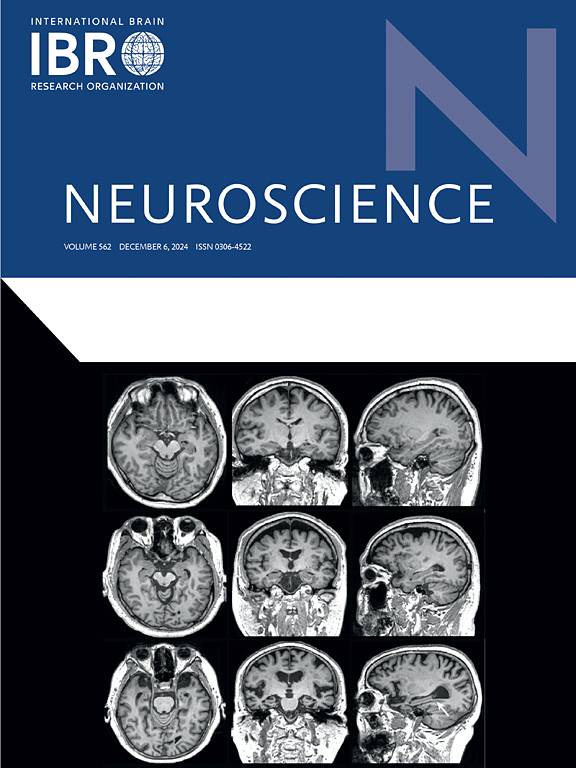Neuroinflammation in long COVID: the role of the Val16Ala polymorphism of SOD2 and cognitive impairment
IF 2.8
3区 医学
Q2 NEUROSCIENCES
引用次数: 0
Abstract
Long COVID (LC) includes persistent behavioral and cognitive deficits, impacting quality of life. Neuroinflammation plays a key role in these alterations, with genetic factors influencing susceptibility. The MnSOD Val16Ala SNP is associated with neuroinflammation and cognitive dysfunction, but its role in LC remains unclear. This study investigated the relationship between the SOD2 Val16Ala polymorphism and neurocognitive alterations in young adults post-SARS-CoV-2 infection. Neurocognitive performance was assessed using the Neupsilin test in individuals with and without prior COVID-19. Blood samples were collected for the quantification of cytokines (IL-1, IL-6, TNF-α, and IFN-γ) and for the genotyping of the SOD2 Val16Ala polymorphism. The COVID-19 group showed worse cognitive performance and higher cytokine levels than controls, particularly in memory and executive function. Val allele carriers (Val/Ala and Val/Val) exhibited increased pro-inflammatory cytokine levels compared to Ala/Ala carriers. These findings suggest a potential interaction between genetic susceptibility and inflammatory response in post-COVID neurocognitive alterations. Young adults post-COVID-19 presented an exacerbated neuroinflammatory response, likely influencing cognition. The presence of the Val allele was associated with greater susceptibility to inflammatory events, suggesting a genetic component in LC-related neurological dysfunction. These results reinforce the role of neuroinflammation in LC and highlight the importance of genetic factors in determining cognitive outcomes. Understanding these mechanisms may help identify individuals at higher risk and support future therapeutic strategies.

长冠神经炎症:SOD2 Val16Ala多态性与认知功能障碍的关系
长期COVID (LC)包括持续的行为和认知缺陷,影响生活质量。神经炎症在这些改变中起关键作用,遗传因素影响易感性。MnSOD Val16Ala SNP与神经炎症和认知功能障碍有关,但其在LC中的作用尚不清楚。本研究探讨了SOD2 Val16Ala多态性与年轻人sars - cov -2感染后神经认知改变的关系。使用Neupsilin测试评估患有和未患有COVID-19的个体的神经认知表现。采集血液样本,定量检测细胞因子(IL-1、IL-6、TNF-α和IFN-γ),并对SOD2 Val16Ala多态性进行基因分型。与对照组相比,COVID-19组表现出更差的认知表现和更高的细胞因子水平,尤其是在记忆和执行功能方面。Val等位基因携带者(Val/Ala和Val/Val)与Ala/Ala携带者相比,促炎细胞因子水平升高。这些发现表明,在covid后神经认知改变中,遗传易感性和炎症反应之间存在潜在的相互作用。年轻人在covid -19后表现出加剧的神经炎症反应,可能影响认知。Val等位基因的存在与对炎症事件的更大易感性相关,表明遗传成分与lc相关的神经功能障碍有关。这些结果加强了神经炎症在LC中的作用,并强调了遗传因素在决定认知结果中的重要性。了解这些机制可能有助于识别高风险个体并支持未来的治疗策略。
本文章由计算机程序翻译,如有差异,请以英文原文为准。
求助全文
约1分钟内获得全文
求助全文
来源期刊

Neuroscience
医学-神经科学
CiteScore
6.20
自引率
0.00%
发文量
394
审稿时长
52 days
期刊介绍:
Neuroscience publishes papers describing the results of original research on any aspect of the scientific study of the nervous system. Any paper, however short, will be considered for publication provided that it reports significant, new and carefully confirmed findings with full experimental details.
 求助内容:
求助内容: 应助结果提醒方式:
应助结果提醒方式:


